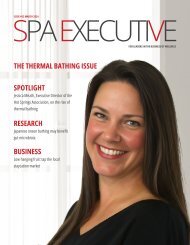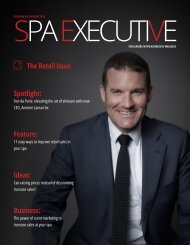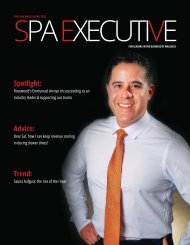Create successful ePaper yourself
Turn your PDF publications into a flip-book with our unique Google optimized e-Paper software.
wrote, “These studies combined suggest the<br />
stress-alleviating effects (decreased cortisol)<br />
and the activating effects (increased<br />
serotonin and dopamine) of massage therapy<br />
on a variety of medical conditions and<br />
stressful experiences.”<br />
Another study found that subjects who<br />
underwent Swedish massage twice a week<br />
experienced decreases in cortisol levels and<br />
increases in oxytocin levels. Researchers also<br />
found slight evidence of increased white<br />
blood cell counts.<br />
Reflexology is associated with stress<br />
reduction and decreased blood pressure<br />
A 2007 study at Angela Ruskin University<br />
examined the effects of reflexology on stress<br />
and anxiety and found that patients who<br />
underwent reflexology treatments<br />
experienced bigger decreases in anxiety and<br />
cardiovascular activity than a control group.<br />
These results were consistent with “stress<br />
reduction,” said the authors.<br />
Also, a 2017 study published in the European<br />
Journal of Integrative Medicine found that<br />
hand reflexology alleviated anxiety without<br />
any adverse effects on patients before<br />
coronary angiography, and concluded that it<br />
can be recommended as a<br />
non-pharmacological nursing intervention<br />
along with other methods to relieve patients’<br />
anxiety.<br />
And a 2006 study published in the Journal of<br />
Korean Academy of Nursing looked at the<br />
effects of a self-foot reflexology massage on<br />
depression, stress responses and immune<br />
function in middle-aged women, and found<br />
that there was a statistically significant<br />
difference in depression, perceived stress,<br />
systolic blood pressure, and natural-killer<br />
cells. The authors concluded that “a self-foot<br />
reflexology massage could be utilized as an<br />
effective nursing intervention to reduce<br />
depression and stress responses, and to<br />
strengthen immune systems in middle-aged<br />
women.”<br />
Facial massage lifts mood and calms<br />
anxiety<br />
Facials aren’t just good for the skin. They’re<br />
also good for mood and wellbeing.<br />
A 2008 study at Kyushu University, in<br />
Fukuoka, Japan found that a 45-minute facial<br />
massage reduced anxiety and alleviated<br />
negative mood in healthy adult women.<br />
The study involved 32 women, ranging in age<br />
from 20 to 40. Each received the same type<br />
of facial massage, in which the face was first<br />
massaged using a cream-based lubricant.<br />
That was followed by a steam treatment, after<br />
which the face was massaged again with a<br />
moisturizing lotion. Heart rate and<br />
parasympathetic and sympathetic nervous<br />
activity were measured before and after each<br />
massage. Mood and anxiety levels were also<br />
measured. Parasympathetic nervous activity<br />
increased during the massage, and<br />
sympathetic nervous activity increased<br />
afterwards. The former is linked with a<br />
relaxed physical state, and the latter to a<br />
stimulated physical state, and study authors<br />
theorized that facial massage may have a<br />
stimulating or refreshing effect as well as<br />
relaxation benefits.<br />
The study also found significant decreases in<br />
anxiety and negative mood. “These results<br />
suggest that the facial massage had strong<br />
effects on stress alleviation, or psychological<br />
relaxation,” said the authors.<br />
Technology<br />
<strong>Spa</strong> <strong>Executive</strong> | 20


















